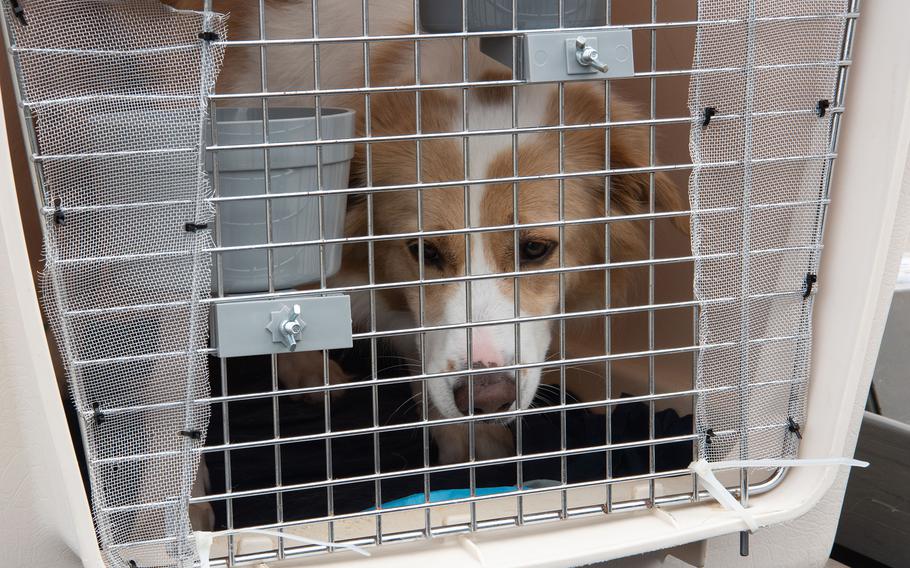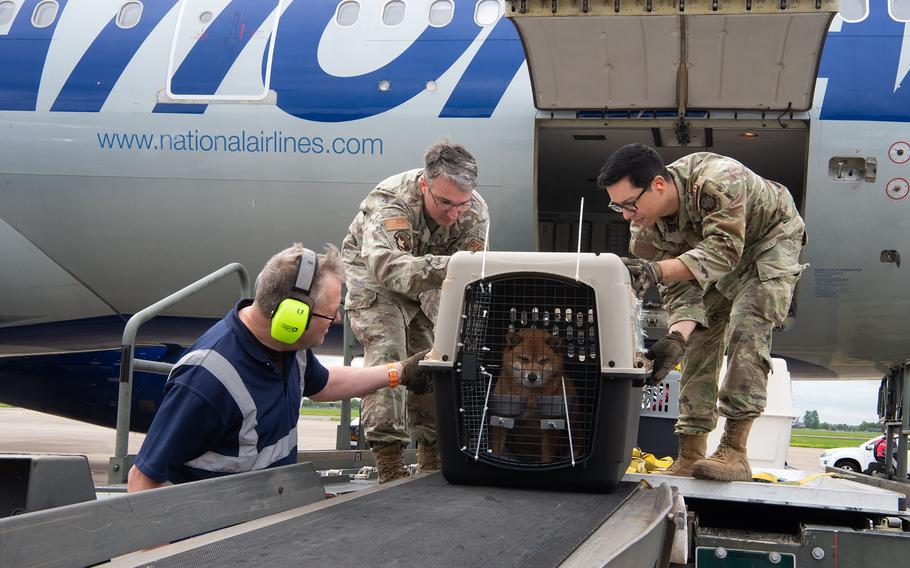
A family pet sits in a carrier after being unloaded from the Patriot Express at RAF Mildenhall, England, in May 2023. The Centers for Disease Control and Prevention has issued new regulations for bringing dogs into the U.S. (Anthony Hetlage/Air Force)
GRAFENWOEHR, Germany — An airline relied upon to send many Europe-based military families with pets back to the United States plans to stop transporting most dogs beginning next month, a decision that could mean added costs and complications at the height of the military moving season.
Lufthansa, a German airline which code shares with United Airlines on many flights from Europe, made the decision to stop accepting pet dogs starting Aug. 1 in reaction to a new U.S. rule that requires airlines to verify canine health records.
Lufthansa is one of the primary carriers in Germany used to fly service members on permanent change of station orders back to the U.S., said Vera Flierl, an agent at the Vilseck office for Sato Travel, the agency responsible for booking official flights for military personnel.
The commercial airline is the only one used for pets during hot summer months, because they alone have temperature-controlled cargo areas among airlines the SATO office is authorized to book, she said.

U.S. airmen unload pets from the Patriot Express at RAF Mildenhall, England, in May 2023. The Centers for Disease Control and Prevention has issued new regulations for bringing dogs into the U.S. (Anthony Hetlage/Air Force)
“We’re still waiting for something in writing where they said either the pets which are confirmed [after Aug. 1] are still good or if they will also get canceled,” Flierl said.
Service dogs will still be accepted, as required by U.S. law, Lufthansa spokesman Tal Muscal said in an emailed statement Thursday. He did not respond to a follow-up email asking whether preexisting reservations past Aug. 1 would be honored.
Lufthansa’s decision is a result of a U.S. Centers for Disease Control and Prevention rule released in May.
It states that any dog imported to the U.S. starting Aug. 1 must be at least six months old, healthy and microchipped. Dogs must also have proof of rabies vaccination and serologic test results from a CDC-approved laboratory.
If airlines fail to police the new requirements, they could be held responsible for shipping the animals back to the country of departure within 72 hours.
The rule is primarily focused on preventing the reintroduction of canine rabies, which was eradicated in the U.S. in 2007.
Airlines for America, an industry trade organization representing American, Delta and United Airlines, among others, on July 9 sent a letter to the CDC requesting an extension.
“We remain very concerned that the rule will have unintended consequences harmful to the travelling public,” the letter states. “These unintentional harms will occur during the peak of summer travel season.”
On July 11, Liz Hensel, founder of Leave No Paws Behind USA, a group that assists service members with resources and pet transportation costs, called on Congress to exempt military families from the new CDC rules and to increase vaccination facilities.
The new regulations and Lufthansa embargo are already causing “considerable distress and hardship” for military families, Hensel wrote.
When asked by Stars and Stripes on Wednesday if they would postpone the rule, the CDC said in a statement that they were aware of the concerns and “actively working with federal and international partners to discuss the feedback received.”
The U.S. Transportation Command has no plans at this time to alter schedules or increase in-cabin pet spaces on Patriot Express flights to the U.S., spokesman Nate Allen said in a statement Tuesday.
The Patriot Express is a commercial charter contracted by the Defense Department.
“If presented with significant increase in requirements we have and will engage with commercial partners to increase capacity where possible,” Allen said.
Both Muscal and Flierl recommended troops use an air freight carrier that specializes in animal transport to ship pets, such as Lufthansa Cargo.
Service members are eligible to receive up to $2,000 for one cat or dog in reimbursable expenses for PCS moves to or from the continental U.S. and $550 on domestic flights.